SEDI – Search Engine & Digital Insights
May 7, 2024
The Digital Markets Act (DMA), effective March 6th, 2024, is reshaping Google’s Search Engine Results Pages (SERPs) across Europe. It aims to restrict the dominance of major digital platforms (gatekeepers such as Google, Amazon, Apple, etc.) and promote fair competition.
The DMA is causing ripples in the tech industry, particularly for giants like Google. Designed to uphold fair competition and protect consumers, the DMA came into effect recently, prompting scrutiny of Google’s practices by entities like the EU Travel Tech Association.
One area of contention is Google Flights, which critics argue gives Google an unfair advantage over competing services. In compliance with the DMA, Google planned to remove the Google Flights unit from search results in the European Economic Area (EEA) countries and introduced new dedicated SERP Experiences featuring links from competitors.
As Google navigates the complexities of DMA compliance, the tech giant emphasizes ongoing engagement with stakeholders and a commitment to transparency. However, the true impact of these changes remains uncertain, with stakeholders watching closely as Google adapts to the evolving regulatory landscape in Europe.
Before getting into the details of each new SERP feature, let’s address some of the common patterns we found.
The Flight Sites unit offers users access to leading flight aggregators for their flight queries. It displays price information from each aggregator, providing users with pricing details.

Skyscanner flight search filters
Here are some attributes of the Flight Sites feature:
Google’s new Airline Options table provides users with a comprehensive overview of available flights from various airlines for searched routes. It includes price information for both non-stop and connecting flights.

Here are some attributes of the Airline Options panel:
This feature appears under the meta description shown in SERP. It includes the date, route, number of stops, one-way/round-trip information, and ticket price.
Prices are gathered directly from the airline or aggregator, not from the webpage that appears on the search result.

It’s important to note that the Rich Web Results feature may prevent the rich snippet from our Product schema from showing up in SERP. It is not possible to influence Google to show our Product rich snippet instead, and the domain won’t have any control over it.
The screenshots below show an example of Google displaying the Rich Web Results feature and not displaying it for the same keyword. However, the captures are from different days.
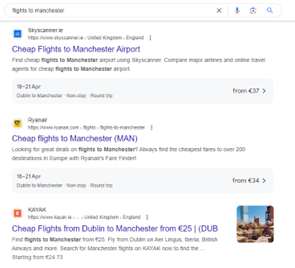
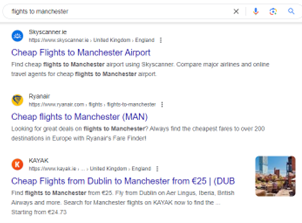
The Refinement Chips are the filtering buttons right under the search bar. They allow users to filter flight queries based on specific criteria, such as preferred airlines, travel dates, or flight type (one-way or round trip).
The Refinement Chips are randomly repositioned after each search. Airlines or Aggregators are not required to add any markup to be featured on the refinement chips.

The available Refinement Chips include:
When applied, the value of the Refinement Chips will be added to the keyword, and the rest of the new SERP features will be adjusted accordingly.
For example, if a user searches for “flights to london” and later selects the 1-5 April date, the date will be appended to the original keyword. Also, the date range is applied to all the SERP features. Notice the dates in the screenshot below:
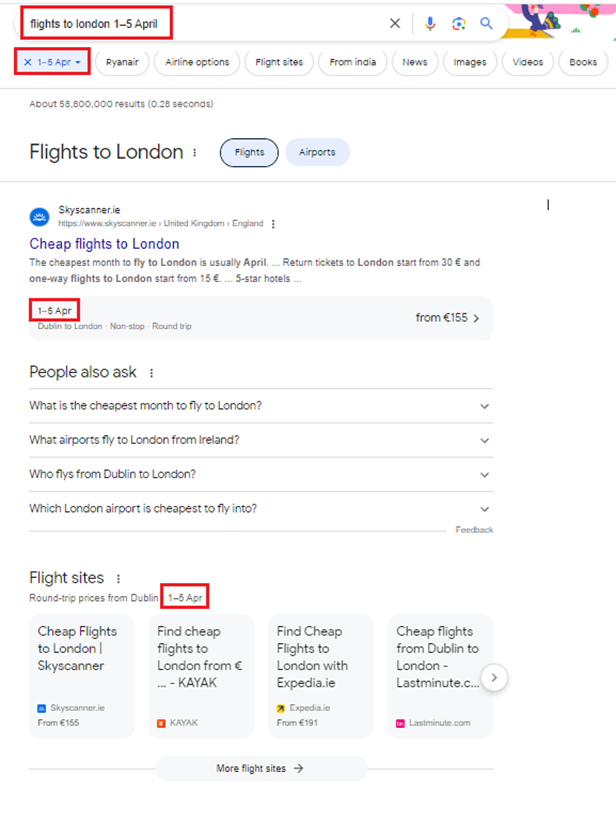
Google says that prices are gathered directly from the airlines and aggregators to help users get accurate and up-to-date information.
Non-branded and hybrid keywords trigger the new features in SERPs.
However, hybrid keywords change the behavior of the Flights Sites and Airlines Options features, which include only the fares with the searched airlines. Also, the Flights Sites and the Airlines Options chip refinement don’t appear.
The non-branded queries for which we noticed that the new features are triggered in the SERP are connected to the page templates To City and City-to-City.
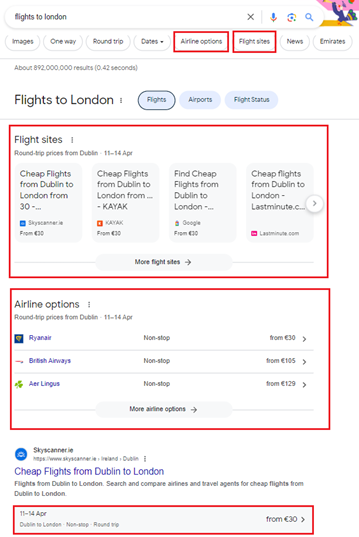
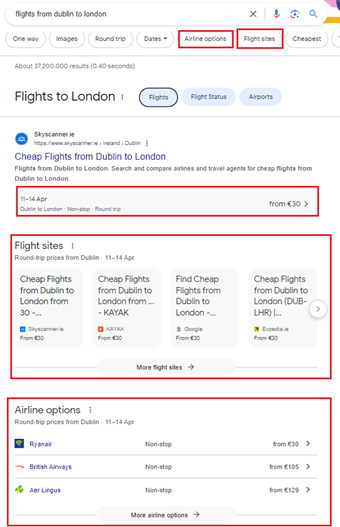
There are also a few keyword variations that trigger the new SERP features:
Hybrid search queries (e.g., “aer lingus flights to London”) also trigger the new SERP features.
However, once the airline name is added to the search query, the new SERP features will include
only the fares from the searched airlines. Also, the Flights Sites chip refinement and the Airlines
Options chip refinement will not appear, as we can see in the following screenshots.

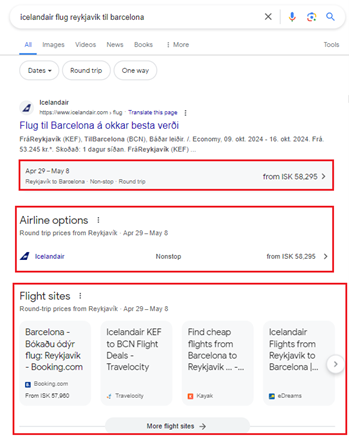
The new SERP features look the same on desktop and mobile devices. However, the position of the Chip Refinements is different.
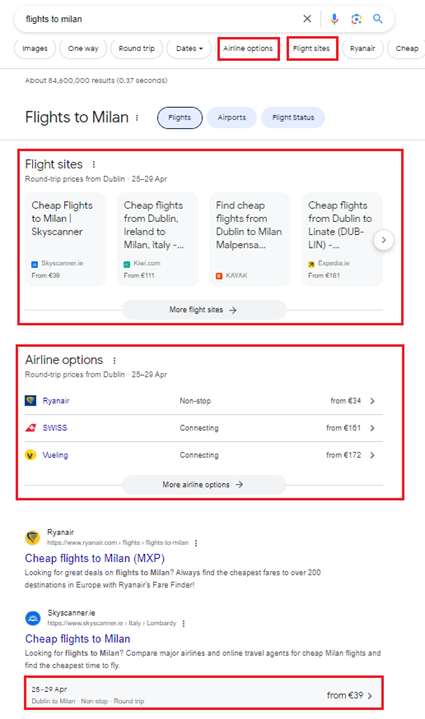
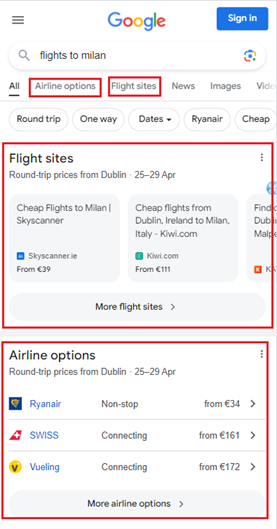
The position of new features in Google’s SERPs seems dynamic and unpredictable, with no definitive pattern determining their exact placement.
The below screenshots show the new features in different positions.
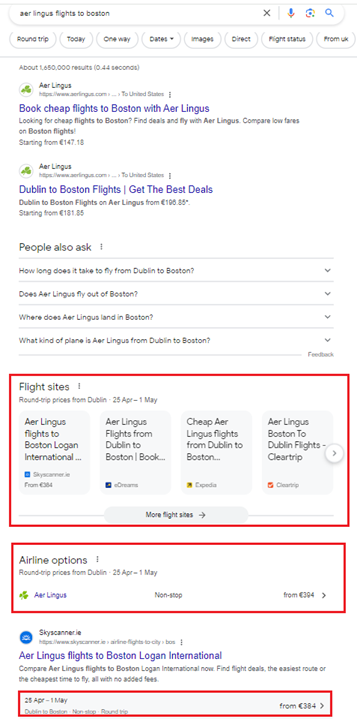
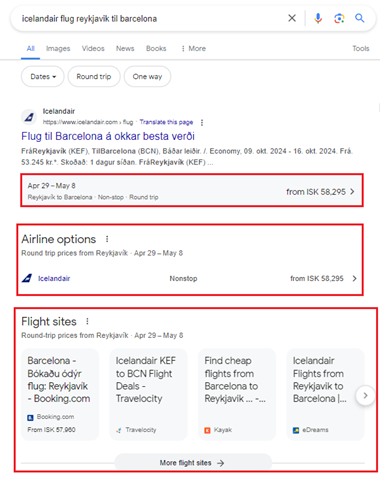
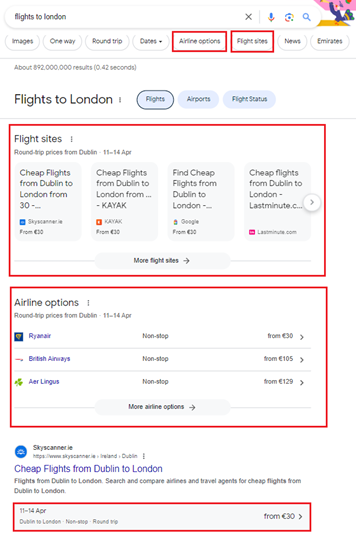
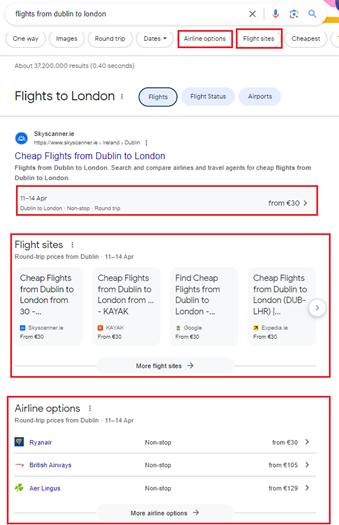
What’s going on today in Advanced Web Rankings (AWR)? AWR, the keyword tracking tool used by PROS, currently ignores the new SERP features when determining keyword positions.
However, with the Google Flights box off Europe’s SERPs, airlines tracking keywords in the EEA’s SERPs will see potential rankings improvements.
Here is why:
Back in October 2023, AWR began tracking the Google Flights box as part of the flight queries’ SERP. This tracking change on AWR’s side impacted all those airlines with keywords ranking in first place. Why? Because AWR attributed the first place to the Google Flights box. Thus, all keywords previously ranking in the first place shifted a position down and were reported in position #2.
Now, with Google Flights vanishing from the picture in the EEA, AWR went back to standard tracking. This means that airlines that had pages ranking for keywords appearing in position #2 when Google Flights was still present it could seem to shift up to 1st place. Notice in the picture below how the green curve (keywords in 1st place) shrunk in October and expanded soon after Google Flights was deprecated in early February 2024.

AWR recently announced that the new Flight Sites will be introduced in the next months as part of AWR’s SERP features filters. We will continue monitoring how AWR tracks and reports the new SERP experiences and what this means for airTRFX pages’ organic performance.
No. The flight information and links shown in the SERP features are taken from Google systems, which gather data from the airlines and aggregators’ databases rather than from web pages.
The goal of the DMA Act is to balance the competition in SERP. However, it is still uncertain how the changes implemented will affect the SEO performance of airTRFX pages in the long term.
Further research will be necessary to understand from a data-driven perspective how airTRFX pages could seem impacted.
Flight prices can vary because different platforms use different data sources.
Google pulls prices directly from airlines’ and aggregators’ databases, while airTRFX relies on FareNet or the APIs that the airline source to feed all airTRFX pages and airModules. This can lead to differences in the fares you see in SERP.
However, this is not a concern from a legal standpoint because the user will still land on a page (in this case airTRFX) which will have the latest available fare before booking. The SERP is only an indicative result, but it is never considered as the final price the user will book because the purchase is not happening after 1 click from the SERP.
This is not only a challenge on airlines, all industries will face potential differences in pricing from what Google shows on the SERP and what users see on the landing page because of the multiple available data sources of pricing. This has also been the situation in the past where the website used pricing on the metadata or Offer/Price schemas.

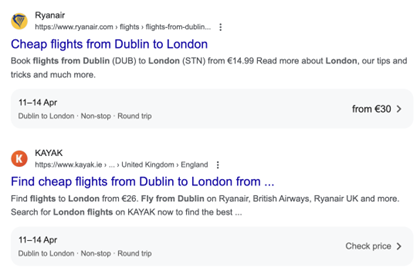
The reason why there are different fares in the SERP above is because Google is re-writing the meta descriptions of all three results. The price displayed in the meta description is being pulled from the landing page’s H1 and the price displayed in the Rich Web Result is pulled from the airline’s databases available to Google. (Read the previous question for a more detailed explanation). It is not uncommon to see Google re-writing meta descriptions. According to the Search Engine Journal, “Google rewrites meta descriptions 70% of the time”. The price difference may also be attributed to the type of fare displayed, that is, one-way/round-trip fares.
AWR is currently working on updates and we still need to wait until they include tracking of the new SERP features. With Google Flights off the picture and potential new tracking implemented on AWR’s side, there is a potential shift in rankings impacting the top ten positions.